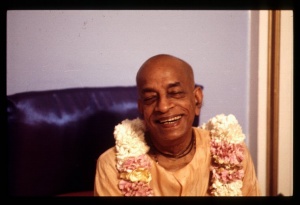SB 7.4.13: Difference between revisions
m (1 revision(s)) |
No edit summary |
||
| Line 1: | Line 1: | ||
{{info | {{info | ||
|speaker= | |speaker=Nārada Muni | ||
|listener=King | |listener=King Yudhiṣṭhira | ||
}} | }} | ||
[[Category:Srimad-Bhagavatam - Canto 07 Chapter 04]] | |||
[[Category:Bhagavatam Verses Spoken by Narada Muni - Vanisource|070413]] | |||
<div style="float:left">'''[[Srimad-Bhagavatam]] - [[SB 7|Seventh Canto]] - [[SB 7.4: Hiranyakasipu Terrorizes the Universe|Chapter 4: Hiraṇyakaśipu Terrorizes the Universe]]'''</div> | |||
<div style="float:right">[[File:Go-previous.png|link=SB 7.4.9-12]] '''[[SB 7.4.9-12]] - [[SB 7.4.14]]''' [[File:Go-next.png|link=SB 7.4.14]]</div> | |||
{{RandomImage}} | |||
==== TEXT 13 ==== | ==== TEXT 13 ==== | ||
<div | <div class="verse"> | ||
tam aṅga mattaṁ madhunoru-gandhinā | :tam aṅga mattaṁ madhunoru-gandhinā | ||
vivṛtta-tāmrākṣam aśeṣa-dhiṣṇya-pāḥ | :vivṛtta-tāmrākṣam aśeṣa-dhiṣṇya-pāḥ | ||
upāsatopāyana-pāṇibhir vinā | :upāsatopāyana-pāṇibhir vinā | ||
tribhis tapo-yoga-balaujasāṁ padam | :tribhis tapo-yoga-balaujasāṁ padam | ||
</div> | </div> | ||
| Line 17: | Line 22: | ||
==== SYNONYMS ==== | ==== SYNONYMS ==== | ||
<div | <div class="synonyms"> | ||
''tam''—him (Hiraṇyakaśipu); ''aṅga''—O dear King; ''mattam''—intoxicated; ''madhunā''—by wine; ''uru-gandhinā''—strong-smelling; ''vivṛtta''—rolling; ''tāmra-akṣam''—having eyes like copper; ''aśeṣa-dhiṣṇya-pāḥ''—the principal men of all the planets; ''upāsata''—worshiped; ''upāyana''—full with paraphernalia; ''pāṇibhiḥ''—by their own hands; ''vinā''—without; ''tribhiḥ''—the three principal deities (Lord Viṣṇu, Lord Brahmā and Lord Śiva); ''tapaḥ''—of austerity; ''yoga''—mystic power; ''bala''—bodily strength; ''ojasām''—and power of the senses; ''padam''—the abode. | |||
</div> | </div> | ||
| Line 24: | Line 29: | ||
==== TRANSLATION ==== | ==== TRANSLATION ==== | ||
<div | <div class="translation"> | ||
O my dear King, Hiraṇyakaśipu was always drunk on strong-smelling wines and liquors, and therefore his coppery eyes were always rolling. Nonetheless, because he had powerfully executed great austerities in mystic yoga, although he was abominable, all but the three principal demigods—Lord Brahmā, Lord Śiva and Lord Viṣṇu—personally worshiped him to please him by bringing him various presentations with their own hands. | O my dear King, Hiraṇyakaśipu was always drunk on strong-smelling wines and liquors, and therefore his coppery eyes were always rolling. Nonetheless, because he had powerfully executed great austerities in mystic yoga, although he was abominable, all but the three principal demigods—Lord Brahmā, Lord Śiva and Lord Viṣṇu—personally worshiped him to please him by bringing him various presentations with their own hands. | ||
</div> | </div> | ||
| Line 31: | Line 36: | ||
==== PURPORT ==== | ==== PURPORT ==== | ||
<div | <div class="purport"> | ||
In the Skanda Purāṇa there is this description: upāyanaṁ daduḥ sarve vinā devān hiraṇyakaḥ. Hiraṇyakaśipu was so powerful that everyone but the three principal demigods—namely Lord Brahmā, Lord Śiva and Lord Viṣṇu—engaged in his service. Madhvācārya says, ādityā vasavo rudrās tri-vidhā hi surā yataḥ. There are three kinds of demigods—the Adityas, the Vasus and the Rudras—beneath whom are the other demigods, like the Maruts and Sādhyas (marutaś caiva viśve ca sādhyāś caiva ca tad-gatāḥ). Therefore all the demigods are called tri-piṣṭapa, and the same word tri applies to Lord Brahmā, Lord Śiva and Lord Viṣṇu. | In the ''Skanda Purāṇa'' there is this description: ''upāyanaṁ daduḥ sarve vinā devān hiraṇyakaḥ''. Hiraṇyakaśipu was so powerful that everyone but the three principal demigods—namely Lord Brahmā, Lord Śiva and Lord Viṣṇu—engaged in his service. Madhvācārya says, ''ādityā vasavo rudrās tri-vidhā hi surā yataḥ''. There are three kinds of demigods—the Adityas, the Vasus and the Rudras—beneath whom are the other demigods, like the Maruts and Sādhyas (''marutaś caiva viśve ca sādhyāś caiva ca tad-gatāḥ''). Therefore all the demigods are called ''tri-piṣṭapa'', and the same word ''tri'' applies to Lord Brahmā, Lord Śiva and Lord Viṣṇu. | ||
</div> | </div> | ||
__NOTOC__ | |||
<div style="float:right; clear:both;">[[File:Go-previous.png|link=SB 7.4.9-12]] '''[[SB 7.4.9-12]] - [[SB 7.4.14]]''' [[File:Go-next.png|link=SB 7.4.14]]</div> | |||
__NOTOC__ | |||
__NOEDITSECTION__ | |||
Revision as of 09:08, 30 May 2021

A.C. Bhaktivedanta Swami Prabhupada
TEXT 13
- tam aṅga mattaṁ madhunoru-gandhinā
- vivṛtta-tāmrākṣam aśeṣa-dhiṣṇya-pāḥ
- upāsatopāyana-pāṇibhir vinā
- tribhis tapo-yoga-balaujasāṁ padam
SYNONYMS
tam—him (Hiraṇyakaśipu); aṅga—O dear King; mattam—intoxicated; madhunā—by wine; uru-gandhinā—strong-smelling; vivṛtta—rolling; tāmra-akṣam—having eyes like copper; aśeṣa-dhiṣṇya-pāḥ—the principal men of all the planets; upāsata—worshiped; upāyana—full with paraphernalia; pāṇibhiḥ—by their own hands; vinā—without; tribhiḥ—the three principal deities (Lord Viṣṇu, Lord Brahmā and Lord Śiva); tapaḥ—of austerity; yoga—mystic power; bala—bodily strength; ojasām—and power of the senses; padam—the abode.
TRANSLATION
O my dear King, Hiraṇyakaśipu was always drunk on strong-smelling wines and liquors, and therefore his coppery eyes were always rolling. Nonetheless, because he had powerfully executed great austerities in mystic yoga, although he was abominable, all but the three principal demigods—Lord Brahmā, Lord Śiva and Lord Viṣṇu—personally worshiped him to please him by bringing him various presentations with their own hands.
PURPORT
In the Skanda Purāṇa there is this description: upāyanaṁ daduḥ sarve vinā devān hiraṇyakaḥ. Hiraṇyakaśipu was so powerful that everyone but the three principal demigods—namely Lord Brahmā, Lord Śiva and Lord Viṣṇu—engaged in his service. Madhvācārya says, ādityā vasavo rudrās tri-vidhā hi surā yataḥ. There are three kinds of demigods—the Adityas, the Vasus and the Rudras—beneath whom are the other demigods, like the Maruts and Sādhyas (marutaś caiva viśve ca sādhyāś caiva ca tad-gatāḥ). Therefore all the demigods are called tri-piṣṭapa, and the same word tri applies to Lord Brahmā, Lord Śiva and Lord Viṣṇu.